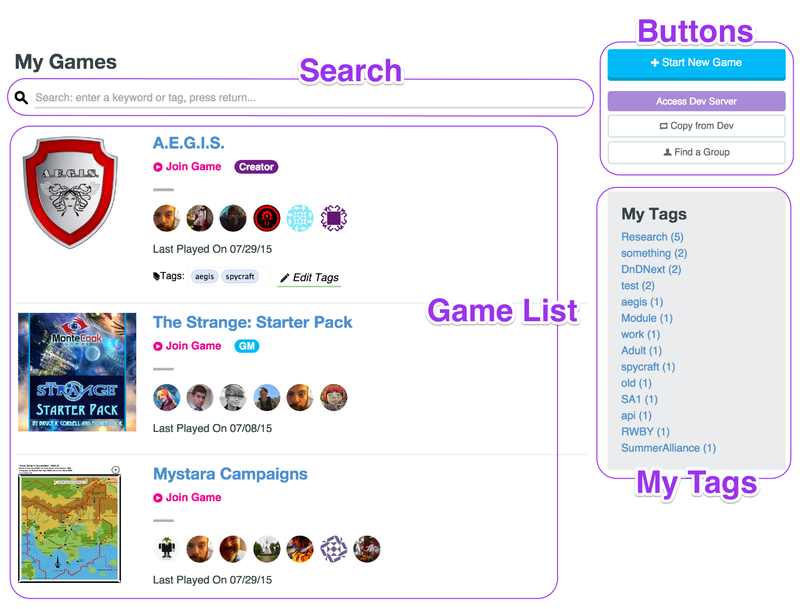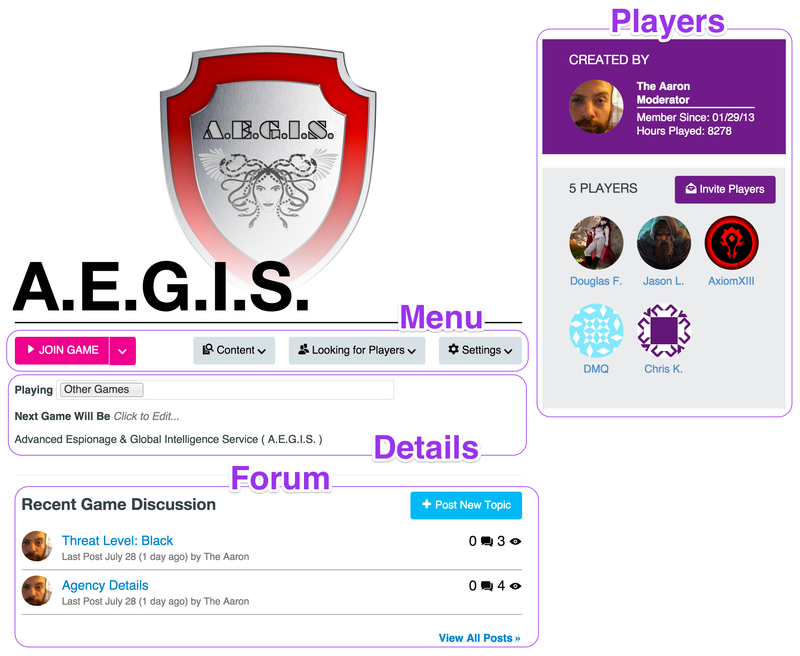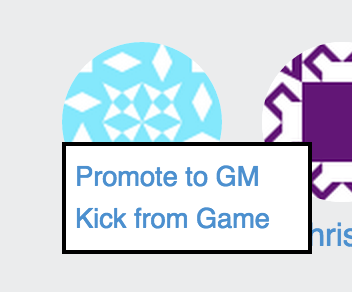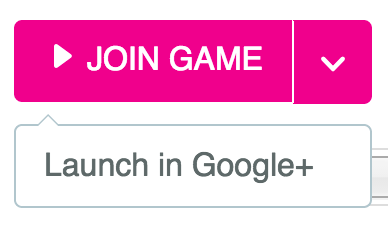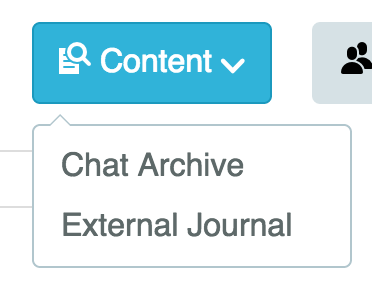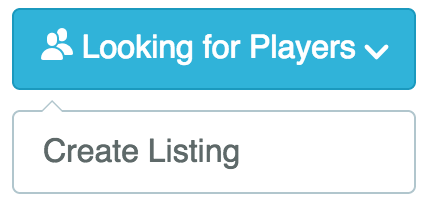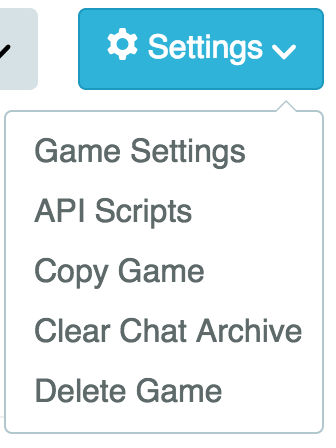Difference between revisions of "Game Management"
From Roll20 Wiki
m (→Leave Game) |
m (→My Games) |
||
| Line 28: | Line 28: | ||
** Games you are a Co-GM on have a '''GM''' badge. | ** Games you are a Co-GM on have a '''GM''' badge. | ||
** Games you are a player in are unadorned. | ** Games you are a player in are unadorned. | ||
| − | |||
== Game Details == | == Game Details == | ||
Revision as of 00:14, 10 September 2016
Contents |
My Games
The My Games page is accessible under the Games entry of the menu bar. (You can also access it by just clicking Games in the menu!) From the My Games page, you can join games, create games, manage the games you are a part of.
Search
Across the top of My Games is a search bar. You can use the search bar to filter your Game List based on tags and keywords.
Buttons
At the top right are a collection of buttons for manipulating your games.
- + Start New Game takes you through the game creation system to setup a new game.
- Access Dev Server' takes you to the Dev Server, a Pro subscription perk.
- Copy from Dev' takes you to a page that lets you copy a game from the Dev Server to the Production Server, a Pro subscription perk.
- Find a Group takes you to the Looking for Group Tool, so you can find more games to add to your Game List.
My Tags
On the right edge is the My Tags box lists all the tags you have defined in decreasing order by how many games have them. You can click a tag to instantly filter the list down to only games with that tag.
Game List
The bulk of the page is taken up by the Game List, which shows all the games you can access. Each listed game shows several pieces of information:
- Click the Game Title to be taken to the Game Details page.
- The Game Image will also take you to the Game Details page.
- Join Game will take you straight into the tabletop for the game.
- Player Icons are listed for each game, showing you who else plays that game.
- The Last Played On date tells you when last the game was in session.
- Games created by you have a Creator badge.
- Games you are a Co-GM on have a GM badge.
- Games you are a player in are unadorned.
Game Details
Each Game you create in Roll20 has its own dedicated details page. For Game Creators and GMs, this is the primary configuration portal for the Game. For Players, this is the centralized location for out-of-game resources such as Journal entries and the Game's private Forum.
Game Icon
At the top of the Game Details page is the Game Icon, which is used to represent your game in the Game List and Looking For Group Listing (if enabled), and also gives your players a feel for your Game. This uploaded image will be added to your Art Library. To set the image, all you need to do is drag a file onto this section, or click the Choose a File... button to be prompted to find a file on your computer. If you already have a Game Icon and want to change it, you can hover over the image and click the Change Image link.
Game Name
The Game Name is used to identify your Game in the Game List and Looking For Group Listing. You can change the Game Name at any time by clicking the name to edit it. Once you are satisfied with the name, you can click the Save button.
Players
The Players section down the right side shows information about the players who are members of this game.
Creator
At the top is a section that describes the game's Creator. Clicking anywhere in this section will take you to the Creator´s user page.
Joined Players
Below the Creator section all of the Players who have joined the Game are listed. Clicking any of the Players‘ icons or names will take you to that Player‘s user page.
Creators and GMs can click the Invite Players button to open a new window and invite more Players via email address, review pending invites and get a unique game ID link that can be copy and pasted to additional Players.
The Game‘s Creator can hover over a Player‘s icon to manipulate the permissions for that Player.
- Promote to GM will grant that Player GM status in the Game, commonly called a co-GM. This is useful for jointly running a Game with someone else or if the Creator would like to become a Player in a Game they created. Promoting someone to GM may also be beneficial in helping another user with GM-level features and or solving Game issues. Promoted to GMs, have limited control over a Game:
- Cannot:
- Change the next game time display.
- Change the Game's description.
- Change the Game's settings options, such as the version of Character Sheet that is set, toggling public access, changing the background image, toggling character import, or list the game in Looking for Players.
- Delete the entire game.
- Kick or Remove Players.
- Clear the Chat Archive.
- A Co-GM will not have access to the original Game‘s Creator‘s image library, character journals, handouts, decks, rollable tables, and other games' pages, however those elements that are being used within the game are available to the Co-GM. Images that are being used within the games' pages can be manipulated by the Co-GM as long as they remain within the game editor. If the Co-GM removes any of these shared elements they will not be available unless the Game‘s Creator restores them to play.
- Use Transmogrifier.
- Can:
- Full access to all layers.
- Create a new map page.
- Put pictures and tokens to the tabletop from their image library.
- Assign and edit tokens.
- Add handouts, new characters, assign journals.
- Move the Players ribbon to different maps.
- Play music from the jukebox.
- Read GM whispers.
- Make macros and token actions and show or hide them from players.
- Control dynamic lighting settings if the Game‘s Creator is a Pro or Plus subscriber.
- Manage the Game‘s forum, including sinking and deleting posts.
- Cannot:
- Demote to Player will return a previously promoted GM back to Player.
- Kick from Game will remove a Player from the Game. Visit this page to kick a player whether you are in-game or not. "Kick from Game" changes the game URL and removes the player from your game.
Menu
The menu gives you access to additional facilities for the Game.
Join Game
This menu allows you to join the Game on the Roll20 Virtual Table Top.
- Clicking on the Join Game button will launch the Game in Roll20 natively.
- Clicking the down arrow on the right will reveal the option to Launch in Google+. Clicking on this link will begin the launch process of starting up the Game in a Google+ Hangout.
Content
- Chat Archive will open a new window that displays the entire chat history of the Game. Whispers from players are not logged in the chat archive.
- External Journal is shown for Games with a Creator who has a Pro or Plus subscription. This link provides External Journal Access. GMs can view journal entries for unarchived Characters and Handouts. Players also have access and can view any Characters or Handouts they have control of in the Game.
Looking for Players
The Looking for Players menu allows a Game's Creator to create or manage the Looking for Group Listing for their Game in Roll20's game directory where other Roll20 players can find it and apply to join it. You must include some basic information about your game in order to list it, including the type of game that you'll be playing and the date and time of the next game to be played.
Settings
The Settings menu provides access to many configuration options for the Game. The Game's Creator can access all of the options, while Promoted GMs can only access a couple. Players instead have the Leave Game option detailed below.
Game Settings
Displays the Game Settings page.
- Allow public access: Allows anyone to view your game details page, public journal entries (marked for "All Players"), and read game forums. Only those you have invited as players will be able to join the game itself, read the chat archive, or post in the forums. Plus & Pro subscribers.
- Game background image: Shown as the background for the game's details page and Looking for Group listing. Hover over the image for a preview of the motion background.
- Allow players to import their own Characters: Allows any player to import existing Characters into this game. You will still have full control over the Character once it is in the game. This is useful for players who are bringing pre-generated Characters due to society-style play or for a quick one-shot.
- Access Compendium In-Game: If you wish to access a different Compendium in-game than the default for your selected Character Sheet, or you are using a Custom Sheet and wish to use a Compendium, select one above. The default is to allow your chosen Character Sheet to determine which Compendium you access. Currently only available for D&D 5e and Pathfinder character sheets.
- Character Sheet Template: Choose from the currently available list of character sheets or with a Pro subscription, choose the "Custom" template to enter your own html, css, and translation code.
API Scripts
Gives Creators and GMs access to the API Script Editor. The Game's Creator must be a Pro subscriber to have access to this feature.
Copy Game
Allows Creators to duplicate the Game. They can rename the duplicate, change its tags, and decide whether to keep all or none of the: Game Icon, Players and Player Settings (Including Macros), Pages, Decks and Rollable Tables, Chat Log, Journal (Characters & Handouts), Jukebox Playlist or the Game Forums. When you have everything designated for the duplicate, click the I'm ready, Create Game! button.
Clear Chat Archive
Allows Creators to PERMANENTLY delete the entire archived chat history from the Game.
Delete Game
Allow Creators to bring up a new window to confirm the deletion of the Game.
Leave Game
Allows player's to leave a Game. Once you leave a game, you no longer have access to the Game and it will no longer show up in your Games page.
Details
The next section down the page holds the Details section, which shows specific information about the Game, from what will be played to when it will be played, as well as freeform text to describe the Game in detail.
Playing
This field shows what systems the Game's Creator has specified are being played in this Game. The Creator can edit the the Playing list by clicking into the box and choosing Popular systems from the dropdown.
- If you don't see your preferred system listed, choose Other Games
- Only the first 2 systems alphabetically will be shown in the Looking For Group Listing, so be sure to only choose two if you'll be using that system.
Next Game Will Be
This field is where a Game's Creator can set the date and time when the next session will occur. The time is automatically converted to the view's local timezone.
Game Description
This is where a Game's Creator can add a blurb advertising what to expect out of the game, flavor text or provide pre-requisites for potential players. This text field is really for anything the Creator feels would be convenient for the Players to know.
To edit the description simply click in the text and change the text to suit you. You can use Markdown formatting to customize the look of your description text. When you are satisfied with your changes, click the Save Changes button.
Forum
The Forum section shows the ten most recent posts from the Game Discussion Forum.
+ Post New Topic
You can click the + Post New Topic button to start a new thread on the Game Discussion Forum.
View All Posts
This link will take you to the full Game Discussion Forum. This is a mini forum exclusive to the Game. It behaves exactly like the public Roll20 forums. The Game's Creator and Gamermasters have access to the Sink, Sticky, and Delete commands. The Sink command will keep a thread at the bottom of the forum regardless of activity. The Sticky Command will pin the thread to the top of the forum. The Delete command will remove the post's text from view by those who are not the Creator or Gamemasters, and deleting the first post in a thread will remove the entire thread from the Game Discussion Forum.





